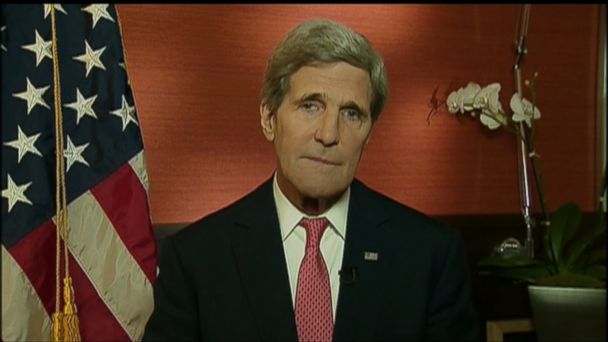Sec. John Kerry: 'No Daylight' Between Israel, U.S. on Goal for Iran Nuclear Program
Following a historic deal on Iran's nuclear program brokered overnight in Geneva, Secretary of State John Kerry sought to temper concerns expressed by Israel over the agreement, saying in an interview on "This Week" that there was no daylight between the U.S. and its closest Middle East ally when it came to their goals for Iran's controversial nuclear program.
"Israel and the United States absolutely share the same goal here. There is no daylight between us, with respect to what we want to achieve at this point," Kerry told "This Week" anchor George Stephanopoulos shortly after the deal was reached. "We both want to make it certain Iran cannot have a nuclear weapon. And Iran cannot be in a place where they can breakout and suddenly get that nuclear weapon."
MORE: Secret Talks Paved Way for Iran Deal
"The deal is the beginning and first step. It leads us into the negotiation," Kerry added. "So that we guarantee that while we are negotiating for the dismantling, while we are negotiating for the tougher positions, they will not grow their program and their capacity to threaten Israel. Israel will actually gain a larger breathing space in terms of the breakout capacity of Iran. It's just clear."
An alliance of countries, coined the P5+1 referring to the five permanent members of the U.N. Security Council plus Germany, announced an initial deal with Iran early Sunday morning at the United Nations building in Geneva. The deal would give Iran temporary, limited relief of sanctions in exchange for the end of any uranium enrichment above 5 percent, the dilution of the most highly enriched uranium in the country, and increased inspections of Iran's nuclear facilities.
Israeli Prime Minister Benjamin Netanyahu, who has repeatedly stated his belief that the Iranian regime poses a threat to the very existence of the Jewish state, called the deal a " historic mistake."
Republican members of Congress were quick to criticize the deal as well, with several releasing statements late Saturday saying it does not go far enough towards dismantling Iran's nuclear centrifuges. Sen. Saxby Chambliss, R-Ga., the top Republican on the Senate Intelligence Committee, told Stephanopoulos he believed the deal would not prevent Iran from developing a nuclear weapon.
"They're going to destroy uranium enriched to 20 percent, but irrespective of what [Kerry] just said, they're going to be able to continue to enrich uranium to 3.5 percent," Chambliss said on "This Week." "They've got six tons now. They're going to allow them to go to seven tons, and then they'll come back down to six tons within the next six months, but they'll still have that capability."
"I just don't see this movement in the direction of preventing Iran from developing a nuclear weapon at all," Chambliss added.
In response to Republican criticisms of the deal, Kerry reiterated that the announced agreement was designed to be a first step before broader discussions in the future.
"This negotiation is not the art of fantasy or the art of the ideal, it's the art of the possible," Kerry said. "You can't always start where you want to wind up."

ABC
One sticking point in the agreement that has already surfaced centers around the recognition of Iran's "right" to enrich uranium. Iranian President Hassan Rouhani told reporters in Iran that the deal does acknowledge this right. But Kerry disagreed, saying Iran faces "stiff hurdles" to gain that ability.
"No, there is no right to enrich. We do not recognize a right to enrich," Kerry said on "This Week."
"They have the ability to negotiate it, but they could only gain that capacity to have some enrichment, as some countries do, if they live up to the whole set of terms necessary to prove its a peaceful program. So, Iran has some very stiff hurdles that they are going to have to meet in order to do that. There is no right and no right granted in this agreement," he said, going on to describe some scenarios where Iran could negotiate a "very limited, completely verifiable, extraordinarily constrained" enrichment program for research and energy production.
As written, the deal calls for no new sanctions against Iran in the next six months, meaning that Kerry and President Obama now face the challenge of selling the package to Congress. On Thursday, Senate Majority Leader Harry Reid, D-Nev., had said he was committed to moving ahead on a bill for tougher sanctions on Iran after the Thanksgiving holiday if no deal had been reached.
Kerry said he was looking forward to the discussion on Capitol Hill.
"I'm confident that as Congress examines what we have been able to achieve here, and as they measure the fact that if you didn't do what we were doing, they would be marching forward and putting more centrifuges in, enriching more, moving closer to a weapon," Kerry said.
Congress is in recess this week for the Thanksgiving holiday. When it returns, Sen. Chambliss said he expects a fight.
"I think you're going to see a strong movement in the United States Senate to move ahead to tighten sanctions," he said.
"Now is just not the time to ease sanctions when they are working. We've got all the leverage in the negotiation and we've let them out of the trap," Chambliss added.
ABC News' Ben Bell contributed to this article.
Like "This Week" on Facebook. You can also follow the show on Twitter.
Check out what time "This Week" airs in your area.